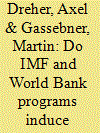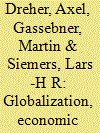|
|
|
Sort Order |
|
|
|
Items / Page
|
|
|
|
|
|
|
| Srl | Item |
| 1 |
ID:
158695


|
|
|
|
|
| Summary/Abstract |
Chinese “aid” is a lightning rod for criticism. Policy-makers, journalists, and public intellectuals claim that Beijing uses its largesse to cement alliances with political leaders, secure access to natural resources, and create exclusive commercial opportunities for Chinese firms—all at the expense of citizens living in developing countries. We argue that much of the controversy about Chinese “aid” stems from a failure to distinguish between China's Official Development Assistance (ODA) and more commercially oriented sources and types of state financing. Using a new database on China's official financing commitments to Africa from 2000 to 2013, we find that the allocation of Chinese ODA is driven primarily by foreign policy considerations, while economic interests better explain the distribution of less concessional flows. These results highlight the need for better measures of an increasingly diverse set of non-Western financial activities.
|
|
|
|
|
|
|
|
|
|
|
|
|
|
|
|
| 2 |
ID:
112461


|
|
|
|
|
| Publication |
2012.
|
| Summary/Abstract |
We examine whether and under what circumstances World Bank and International Monetary Fund (IMF) programs affect the likelihood of major government crises. We find that crises are, on average, more likely as a consequence of World Bank programs. We also find that governments face an increasing risk of entering a crisis when they remain under an IMF or World Bank arrangement once the economy's performance improves. The international financial institution's (IFI) scapegoat function thus seems to lose its value when the need for financial support is less urgent. While the probability of a crisis increases when a government turns to the IFIs, programs inherited by preceding governments do not affect the probability of a crisis. This is in line with two interpretations. First, the conclusion of IFI programs can signal the government's incompetence, and second, governments that inherit programs might be less likely to implement program conditions agreed to by their predecessors.
|
|
|
|
|
|
|
|
|
|
|
|
|
|
|
|
| 3 |
ID:
113757


|
|
|
|
|
| Publication |
2012.
|
| Summary/Abstract |
Using the KOF Index of Globalization and two indices of economic freedom, the authors empirically analyze whether globalization and economic liberalization affect governments' respect for human rights in a panel of 106 countries over the 1981-2004 period. According to their results, physical integrity rights significantly and robustly increase with globalization and economic freedom, while empowerment rights are not robustly affected. Due to the lack of consensus about the appropriate level of empowerment rights as compared to the outright rejection of any violation of physical integrity rights, the global community is presumably less effective in promoting empowerment rights.
|
|
|
|
|
|
|
|
|
|
|
|
|
|
|
|
| 4 |
ID:
137115


|
|
|
|
|
| Summary/Abstract |
Bailouts sponsored by the International Monetary Fund (IMF) are famous for their conditionality: in return for continued installments of desperately needed loans, governments must comply with austere policy changes. Many have suggested, however, that politically important countries face rather weak stringency. Obstacles to testing this hypothesis include finding a measure of political importance that is not plagued by endogeneity and obtaining data on IMF conditionality. We propose to measure political importance using temporary membership on the UN Security Council and analyze a newly available data set on the level of conditionality attached to (a maximum of) 314 IMF arrangements with 101 countries over the 1992–2008 period. We find a negative relationship: Security Council members receive about 30 percent fewer conditions. This suggests that the major shareholders of the IMF trade softer conditionality in return for political influence over the Security Council.
|
|
|
|
|
|
|
|
|
|
|
|
|
|
|
|
| 5 |
ID:
146925


|
|
|
|
|
| Summary/Abstract |
This article investigates the effect of natural resources on whether ethno-political groups choose to pursue their goals with nonviolent as compared to violent means, distinguishing terrorism from insurgencies. It is hypothesized that whether or not the extraction of fossil fuels sparks violence depends both on the group’s characteristics and the state’s reaction. Data are taken from the Minorities at Risk Organizational Behavior (MAROB) project, covering 118 organizations in 13 countries of the Middle East and North Africa over the 1980–2004 period. The multinomial logit models combine group- and country-specific information and show that ethno-political groups are more likely to resort to rebellion rather than using nonviolent means or becoming terrorists when representing regions rich in oil. This effect is enhanced for groups already enjoying regional autonomy or being supported by a foreign state but can be mitigated by power-sharing arrangements. These results are thus in line with the argument that economic considerations, or ‘greed’, dominate over political considerations, or ‘grievances’, with regard to violent conflicts. The opposite appears to hold considering terrorism, as we do not find any evidence for a resource curse here, but find an increasing effect of political discrimination and a decreasing effect of regional autonomy.
|
|
|
|
|
|
|
|
|
|
|
|
|
|
|
|
|
|
|
|
|